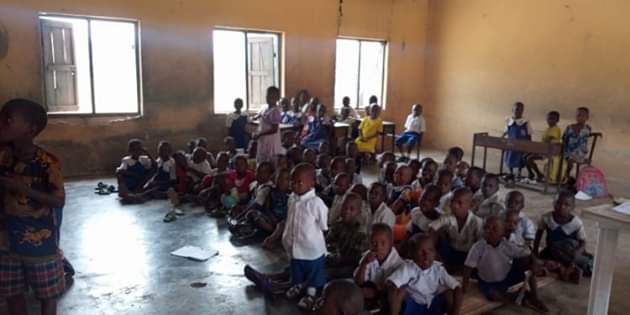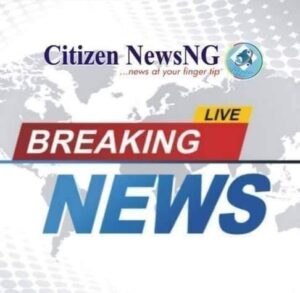
Delta is one of the richest states in Nigeria, yet well-equipped and functional basic and secondary schools are still a mirage in parts of this state that earned N285billion in 2018, and a steady 11-digit monthly allocation from the Federation Account in 2019. Shola O’Neil, South-south Regional Editor and Elo Edremoda, examine the deplorable state of four schools in Udu and Uvwie Local Governments and the fate of thousands of children who attend them
THE sight of the learning condition in some of Delta State’s rural primary and secondary schools would break the most hardened heart. The resuscitation and beautification carried out in some schools during the Emmanuel Uduaghan administration, have eluded hundreds of schools, especially in the rural areas. Here tender learners are subjected to the most excruciating and most deplorable conditions.
Huge budgets
The state allocated over N39 billion to the Ministry of Basic and Secondary Education in 2018 and 2019 budgets. The allocation to the ministry in the N389 billion 2020 budget could not be ascertained at the time of this report. Yet, the conditions of some schools in the state make mockery of any claim of commitment to education.
The schools visited by our reporters tell tales of rot, decay and lack of concern for the future of those who attend the schools. Nowhere is government’s failing of the ‘future leaders’ more highlighted than Sedeco Basic School and Sedeco High School located in Enerhen Community of Uvwie Local Government Area, and Emadadja Primary and Adadja Secondary Schools in Udu LGA, all in Delta Central Senatorial District of the state.
At Emadadaja Primary School, our reporter was assailed by the sights of dozens of pupils, some as young as four, scrambling to learn on bare floor that are riddled with holes and dust. Telltale signs abound that the school that was established 70 years ago has seen better days. There are no basic facilities or furniture: less than 40 desk and chairs are available to over 300 pupils, making the bare floor the only option for children who are desperate to learn.
With fewer than 40 good desks in the entire school, only a few get to sit on the squeaky creaky furniture, but they also have to watch for protruding, rusty nails and screws, which may tear through their uniforms digging into their tender skin. Their less fortunate mates sit or simply lay down on bare, dusty floors, to take sown the teacher’s notes in their exercise books.
Overhead, broken ceiling boards dangle from the roof. The classes and even teachers staff rooms are bare of doors or windows, which means that valuables and books forgotten in school often develop wings and may never be found.
When the school closes, miscreants and hoodlums take over. They litter the school, or just mess up desk and floors with faeces. When the children return to school, especially after weekend or holiday breaks, they are confronted by mountains of human wastes buzzing with flies, assorted smells – hemp, decaying leftover meals, urine and poops. This dangerous mixes expose the children to all kind of maladies.
In the kindergarten class, infants in KG1-3 share just one classroom. The infants sit on mats, with nothing else to battle the elements. As the sun moves from the east to the west, shifting the shadows along, the children also shift along in search of shades from the scotching sun’s heat or from rain fall during rainy season.
One teacher told our reporter that the odds are against pupils in the school.
He said: “It is not easy to learn; when you are teaching, some (pupils) will be jumping here and there and the heat at this time is really terrible. It is a real challenge to the learning process.”
An indigene of the community, Mr. Dave Mevayekuku, described the school as a disgrace and pointer to the failure of those who have governed the state over the years. “I am shocked,” he said while drawing our attention to the state of his former school. “Okowa should come to the aid of the school without delay.”
The Vice-President of Emadadaja Community, Mr. Emmanuel Osiobe, said the people are perplexed by the condition under which their children study, particularly considering that the community contributes to the state’s economy with revenue from crude oil extracted from eight oil wells located on its land.
“The school has remained only because of the community leaders’ efforts. The (last) renovation project was carried out in partnership with an oil company. The company wanted to carry out a project (in 2013), but we said since nobody (government) is showing concern, let us convert the project to school renovation.”
Osiobe explained that there was nothing the leadership of the community could do about defecation in the classes, because of the porous security in the school. He blamed this on failure of government to provide security. “Teachers have reported the problem, but what can we do when there is no gate? The fence has fallen and intruders can even gain entry through the roof.”
Like Primary, like Secondary
Like the primary school, Adadja Secondary school is in a bad shape. There are less than 10 classrooms for about 900 students. Established as a technical school through communal efforts in 1982, the state government took it over in 2006, much to the relief of the community’s leaders who thought that the intervention would usher in an era of infrastructural and facilities upgrade.
A block of five-classrooms built by an oil firm is the only modern structure in the school. Three of the five classrooms in the oil firm’s block are used as staff rooms and library, while two are used by students. Other classes make do with the two uncompleted classroom blocks, one built 38 years ago by the community and the other built by the local council. Yet, a six-classroom block built as constituency project by a state lawmaker was unallocated because there is no furniture and the project has not been properly inaugurated.
The school principal, Mr Boniface Ofovwe, was not available for comment when our reporter visited, but the Examination Officer, Comrade Daniel Ovweghren said several failed efforts have been made by the school authorities and the community leadership to get government’s attention.
Students, rodents share classes
Although the conditions at the Emadadja schools are unsavory, the state of that deprivation pales when compared to the dungeon that is Sedeco schools (a misnomer) in Enerhen area of Uvwie Local Government. The about 1,300 children in primary and secondary schools are taught under the most dehumanising environment.
There is no basic amenity in the school: No pipe borne water, electricity or even toilet facilities. The closest thing to a toilet is a cubicle used exclusively by teachers, while pupils make do with a dumpsite located within the school premises.
About a decade ago, a soft drink company built a block of six very small rooms, which added to the two blocks of three classrooms the school kicked off with in 2007. The only other ‘structures’ are shades constructed by the PTA.
The primary school section has about 350 pupils, who share three classrooms. The situation is the same in the secondary school, with about twice more students.
One of the rooms is used as staff room, while hundreds of pupils share three ‘classrooms’, which are separated by pieces of plywood to accommodate six classes: primaries one and two are cramped into a room, while three and four, and five and six share the other two rooms. Teachers, who cannot squeeze into the staff room, sit around the corridor ad veranda, while preparing lesson notes.
Pupils of the school, who spoke about their fates, lamented the attitude of the state government but commended staff for their doggedness in spite of the challenging environment.
“It is difficult for us to concentrate and learn,” one of the primary four pupils told our reporter, “because two teachers are teaching at the same and they are teaching different classes and subjects. The teachers have to keep shouting for us to hear. Sometimes you don’t even know which of the lectures you are taking”
Due to dearth of the structures and facilities in the school, Science and Arts subjects students in the high school also share classes, with most of the former not having the luxury of using laboratories for practical. One of the schools’ senior teachers disclosed that their students are not allowed to write the West African Examination Council (WAEC) examination, even though they have up to 80 students eligible each year.”
An SSS3 student, Oghenevwaire Shalokpe, lamented that she and other colleagues were preparing for WAEC under very difficult learning conditions.
Focus on good schools
The Commissioner for Basic Education, Mr. Patrick Ukah, who was contacted on the state of the schools, was furious that our reporter was snooping around dilapidated schools in Sedeco and others while ignoring the work the government was doing in other schools.
“There are other schools: Have you seen the work we are doing in Urhobo College, Dom Domingos College and Ugborikoko Secondary School? What about the communities that go in to vandalize school properties? You people don’t report such cases for us. You should talk about that.”
The three schools listed by Mr. Ukah are in the cities of Effurun (Ugborikoko and Urhobo) and Dom Domingos College in Warri metropolis.
“There are 472 secondary schools spread across the 25 local government areas of the state. We cannot attend to all the schools at a time. The budget of the state is contending with roads and other projects,”Ukah added.
He blamed Sedeco school management and the community for the rot seen by The Nation, stressing, “How can you take 1,300 students for a place like that? The place is a swamp.”
“I have to close down that place first, else, where will I build on? On top of that school? Because you are saying there is space. I have told you that I have been there and I am putting my reports together.”
Our findings showed that there is no government school nearby, while private schools are expensive and inaccessible for the poor, who send their children and wards to Sedeco schools.
The Principal, Mrs. Roseline Jike, agreed that only children from indigent families attend the schools. “Government school charges little or nothing, (that is why) they (parents) still prefer to send their children here.
“We do not have (external) examination centre here because we don’t have laboratory, library and the school does not have fence. The population of 1,100 is enough to get a centre, but now we have to write in other schools,” the principal added.
A member of staff of the school, who spoke to our correspondent in confidence, said officials from the Ministry of Education have visited the school to see the deplorable condition under which pupils study.
“We have written letters with photographs of the school to the Ministry of Education through our Chief Inspector of Education.”
But Ukah, who further spoke through his media aide, Mr. Samuel Ijeh, said the government has no plans to renovate the school.
“Nobody promised to build the school in December. The community wants to get a school by all means. Students will be relocated to another place before government will know what can be done to the place.”
An Associate Professor at the Delta State University, Dr. Emmanuel Ufuophu-Biri, explained that the development of the state is hinged on “good and quality education.” He explained that an environment that is not conducive “does have significant negative impact on the teacher and pupils.”
Nevertheless, the Chief Press Secretary to Governor Okowa, Mr. Olisa Ifeajika, who was contacted on the condition of Sedeco Schools, said the issues raised would be resolved.












